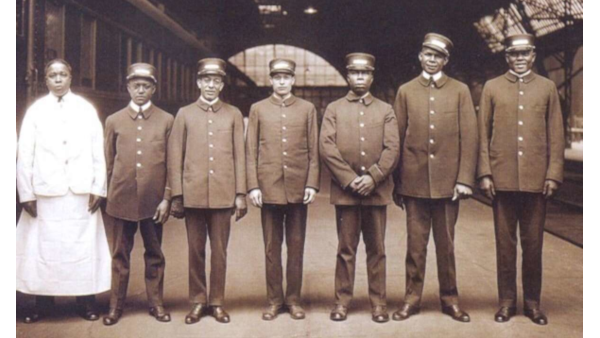
The Pullman Porters who served the White, wealthy, cross-country
travelers in luxury sleeper cars on the railway were hired in the
thousands around 1867 by Chicago businessman George M. Pullman.
Pullman manufactured railroad cars and soon after the end of the
Civil War, his exclusive sleeper cars hit the rails. Pullman, known
for his exploitative and predatory practices, forced Porters to work
for tips only.
Most of the Pullman Porters were former slaves and worked
extraordinarily long hours carrying luggage, shining shoes, cleaning
and preparing the sleeping quarters and serving the traveler with all
their needs. They endured being called “Boy” and “George” after their
boss, George Pullman. Their servitude was encouraged to be exaggerated
to increase the tip, giving them the recognition of the grinning
“Uncle Toms”.
A Pullman worker, Porter J.W. Mays was assigned to serve President
William McKinley in his sleeping car. Mays later served President
McKinley in the White House and eight presidents after him. Like
Porter Mays, many Porters would move on from the railways to fine
hotels and restaurants working for tipped service, a practice that is
unbelievably continued today.
Working over 400 hours a month with hardly any time off, and being the
worst-paid employees in the railway business, Porters looked to the
past at the Pullman Strike of 1894 supported by the American Railway
Union, a union Blacks were not allowed to be a part of.
The 1894 Pullman Strike lasted from May through July, and an estimated
250,000 workers in 27 states which included 29 railroads walked off
their jobs refusing to handle Pullman cars. The strike is known as one
of the most violent strikes in U.S. history and ended when then
President Cleveland sent in Federal troops
Struggling from low pay, the Pullman Porters, in 1925 decided to form
the first Black union-Brotherhood of the Sleeping Car Porters and went
on strike. The Brotherhood strike was vehemently opposed by the
Pullman Company leaving the Porters to fight more than a decade before
a historic collective bargaining agreement was reached. The Porters
won a large wage hike, job security, and hours were set at a limit of
240 working hours a month. Porters saw an end to relying on tips for
wages.
The Brotherhood Movement is given credit for influencing the Great
Migration where millions of Blacks traveled from the South to live and
work in regions of the North and West. A Black middle class was
created and the civil rights movement began.
Almost a hundred years later, the robust movement, onefairwage.org,
continues for millions of service industry workers who are mostly
women of color that rely on inconsistent tips with a subminimum wage
to support themselves and their families.
Winning One Fair Wage in states across the nation, we must, on a
Federal level, eliminate the language of a subminimum wage and pay all
workers a fair, livable, sustainable wage.
Georgia de la Garza, who is from the beautiful Shawnee Forest of Southern Illinois, has served on the front lines as an organizer for social justice for many years. De la Garza has fought for Indigenous rights, Environmental Justice, Labor and Women’s rights on national and global fronts. She serves on the editorial board of the People’s Tribune.
